An Analytical Deep Dive into Thrones: Unpacking the Intricacies of Game of Thrones


Intro
The realm of Westeros, with its rich history and complicated characters, presents a landscape of narrative depth begging for exploration. The world of Game of Thrones is not just a tale of power and betrayal; it is a reflection of human nature, morality, and the consequences of choices. As we dive into this article, we aim to unpack the intricacies that define the series. We will scrutinize key characters, delve into the plotlines, and examine significant themes that resonate deeply within both the story and its audience. By dissecting these elements, we can understand how Game of Thrones has left an indelible mark on contemporary culture.
Character Dissections
Detailed analysis of key characters in Game of Thrones
Characterization in Game of Thrones is nuanced and layered. Figures like Tyrion Lannister, Jon Snow, and Daenerys Targaryen are not merely archetypes but complex individuals shaped by their circumstances.
- Tyrion Lannister: Often regarded as the smartest person in the room, Tyrion navigates the brutal political landscape with wit and strategic thinking. His journey from being shunned by his family to becoming the Hand of the Queen is a study of resilience.
- Jon Snow: As the illegitimate son of Eddard Stark, Jon’s character represents themes of honor and loyalty. His transformation from a member of the Night's Watch to a leader is pivotal, illustrating the notion of identity beyond social conventions.
- Daenerys Targaryen: Driven by a desire to reclaim her family's throne, Daenerys is a symbol of ambition and the complexities of power. Her character arc raises questions about morality, leadership, and justice.
Character development throughout the series
The development of these characters is not stagnant. Each season presents them with moral dilemmas, shaping their choices and defining their paths. For example, Daenerys's initial determination to liberate the oppressed shifts into a ruthless quest for power, sparking debates about heroism and tyranny.
Impact on the overarching storyline
These characters serve as focal points for the overarching narrative, impacting the series' trajectory in profound ways. Their decisions, alliances, and conflicts contribute to the larger themes of power, betrayal, and sacrifice, making character analysis essential for understanding the series.
Episode Breakdowns
Recap of significant events in each episode
Each episode of Game of Thrones is packed with major events that alter the course of the story. They encapsulate everything from battles to personal confrontations, contributing to the complex web of narrative.
Exploration of themes and symbolism
Imagery and symbolism are prevalent throughout the series. The direwolves symbolize loyalty and family, while the Iron Throne represents the corrupting nature of power. Such themes encourage viewers to analyze deeper meanings behind the narrative.
Key moments and their implications
Crucial moments, such as the Red Wedding or the Battle of the Bastards, provide commentary on the brutal nature of politics. These events not only shock the audience but also serve as turning points, emphasizing the unpredictability of the storyline.
Lore Explorations
Delving into the rich history and lore of Westeros
Westeros has a deep and intricate history, with various houses and legends that inform the present. Understanding this history enhances appreciation of character motivations and plot developments.
Uncovering hidden details and connections
Fans are often drawn to the minute details that connect various plot lines across seasons. This exploration reveals the show's creators’ attention to detail, enriching the viewer's experience.
Exploring the cultural and mythical aspects of the world
The lore is not merely backdrop; it informs the political landscape. Elements such as the White Walkers and dragons illustrate the intersection of folklore and reality, offering insights into human fears and aspirations.
Fan Theories
Compilation of popular and intriguing fan theories
The Game of Thrones community is vibrant, filled with theories ranging from plausible to wildly imaginative. Fans often debate possibilities regarding character fates and unresolved plot points.
Evaluation of theories based on evidence from the show
Theory evaluation requires a careful look at the text and character arcs. Some theories stand on solid ground, supported by narrative hints scattered throughout the series.
Speculation on future plot developments
As the series progresses, speculation continues to thrive. Fans constantly reassess prior episodes to predict what might happen next, illustrating the show's depth and complexity.
End
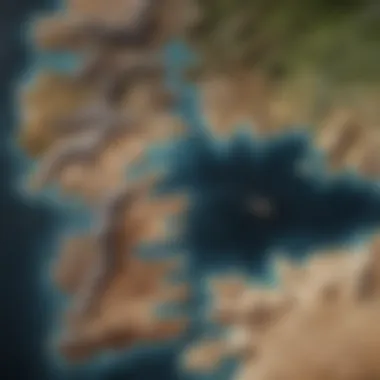
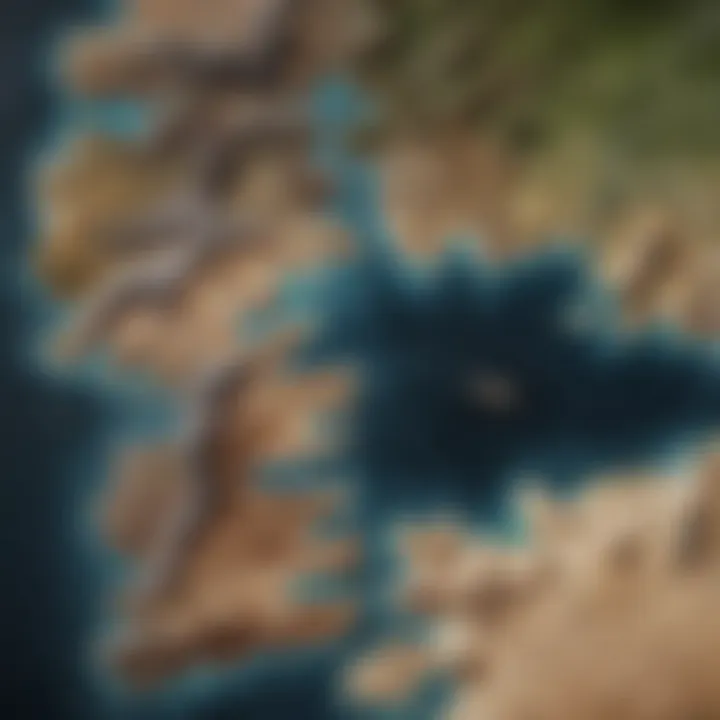
Game of Thrones continues to be a cultural phenomenon, captivating audiences with its depth and intricacy. By examining the characters, episodes, lore, and fan theories, we can appreciate the multi-layered narrative that has defined modern television. Through analytical dissection, we uncover not just a story about a fictional world, but also a reflection of our own struggles, aspirations, and humanity.
Intro to Game of Thrones
Understanding Game of Thrones is essential for exploring its depth. This section provides an entry point for analyzing the show's cultural relevance and narrative structure. It serves as the foundation for the discussions that will follow in the article, highlighting why it is regarded as one of the most significant television series of our time. Through a critical lens, we will dissect its characters, thematic elements, and the intricacies of its plot development.
Overview of the Series
Game of Thrones is an acclaimed television adaptation of George R.R. Martin's book series A Song of Ice and Fire. The show debuted in 2011 on HBO and concluded in 2019 after eight seasons. Each episode intricately weaves together various character storylines while setting the scene in the rich and expansive world of Westeros and Essos.
The series is known for its complex characters, unpredictable plot twists, and shocking events, leaving audiences captivated. As it examines the contest for the Iron Throne, it delves into themes of power, ambition, and morality.
Notably, the show's production values are exceptional. Its lavish set design, costumes, and visual effects create a fascinating backdrop for the conflicts that unfold. With a large ensemble cast, the series explores the motivations and desires of various characters, often leading to moral dilemmas that challenge viewers' perceptions of right and wrong.
Cultural Significance
The cultural impact of Game of Thrones cannot be overstated. It reshaped modern television, elevating high fantasy into mainstream success. The series sparked discussions worldwide, as viewers dissected each episode's plot developments and character dynamics.
"Game of Thrones has made fantasy a genre that everyone can enjoy, bringing it into popular culture."
The show has inspired a vast array of merchandise, fan art, and spin-off media. It also paved the way for new shows that explore similar themes. Its influence extends beyond entertainment, prompting analyses of its commentary on real-world issues such as power, gender roles, and societal norms.
Moreover, digital platforms and forums, such as Reddit, have fostered community discussions and theory crafting, enriching the overall viewer experience. Fans engage deeply with the material, interpreting character motivations and predicting future developments long before new episodes air.
In summary, Game of Thrones serves as a compelling subject for analysis. Its layered narratives, engaging characters, and significant cultural imprint offer a wealth of material to dissect.
Character Dissections
Character dissections are crucial in understanding the depths of Game of Thrones. Each character is intricately crafted, often embodying conflicting traits that make them relatable and complex. Their motivations, choices, and consequences of their actions reflect the moral dilemmas present throughout the series. By analyzing these characters, we can gain insights into larger themes of power, loyalty, and survival.
Protagonists and Antagonists
The protagonists and antagonists of Game of Thrones serve as the backbone of the narrative. The clear delineation between heroes and villains blurs frequently, creating multifaceted character portrayals.
Key characters such as Jon Snow, Daenerys Targaryen, and Tyrion Lannister often grapple with their own flaws while embodying heroic traits. Jon's sense of honor consistently drives him, placing him in conflict with the ruthless world around him. Conversely, Daenerys begins her journey as a victim but gradually embraces her identity as a conqueror, showcasing an evolution marked by ambition and morality.
Meanwhile, antagonists like Cersei Lannister and Ramsay Bolton are portrayed not just as obstacles, but as complex individuals driven by fear and desire for power. Their motivations stem from a desire to secure positions for themselves and their families, which resonates with the show's recurring theme of the corrupting nature of power.
Character dynamics significantly influence plot progression, as allegiances shift, betrayals occur, and unexpected alliances form. This complexity generates tension and intrigue, prompting viewers to reflect on what defines a hero or a villain.
Character Arcs and Development
Character arcs are a central aspect of the storytelling in Game of Thrones. Each primary character undergoes significant personal growth, facing challenges that test their values and beliefs. The arcs are often marked by pivotal moments that lead to profound transformations.
For example, Jaime Lannister starts as a seemingly arrogant knight, often seen as one-dimensional. However, his journey reveals layers of depth, as he confronts his hubris and ultimately seeks redemption. By the end of the series, his choices reflect a remarkable change, showcasing how experiences can reshape identity.
Similarly, Sansa Stark evolves from an innocent girl with dreams of courtly life into a strong, calculating leader. Her resilience and shrewdness become evident as she navigates through personal trauma and betrayal, illustrating the impact of environment on character formation.
These arcs not only enhance viewer engagement but also serve to communicate broader themes about humanity. They illustrate the idea that individuals can be shaped by their experiences, and even those who stray far from their ideals can find paths back to integrity.
The Role of Women in the Series
In Game of Thrones, the portrayal of women is a subject of both admiration and critique. The series offers a platform for complex female characters who navigate oppressive systems of power while exhibiting strength and agency.
Women like Arya Stark and Cersei Lannister embody different facets of female resilience. Arya’s journey from a sheltered girl to a trained assassin showcases her defiance against societal expectations. Her transformation highlights themes of vengeance, identity, and empowerment.
On the other hand, Cersei’s quest for power exemplifies the ruthless lengths women must sometimes go to in a patriarchal society. Her strategies in manipulating the political landscape reflect the intricate dance of power where gender is both an advantage and a handicap.
The series also captures the brutality women face within the world of Westeros. These experiences serve to comment on gender dynamics and societal roles. By presenting a range of female experiences, Game of Thrones challenges typical representations and provokes important discussions about gender, power, and autonomy.
"The intricacies of character development in Game of Thrones not only enthrall viewers but also invite them to reflect on the nature of humanity itself."
Narrative Techniques and Plot Structure
The narrative techniques and plot structure in Game of Thrones significantly enhance the storytelling experience. These elements bring depth to the series, allowing for intricate character developments and thematic explorations. Understanding how these techniques work is crucial to appreciating the complexity of the tale unfold. The deliberate pacing and intertwining of various plotlines elevate suspense and emotional weight, engaging viewers on multiple fronts.
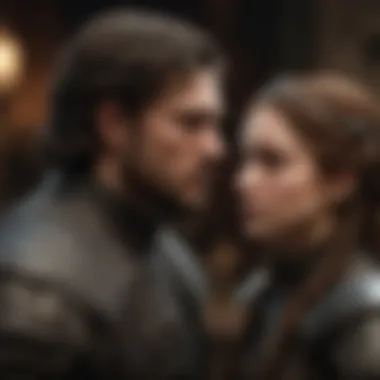
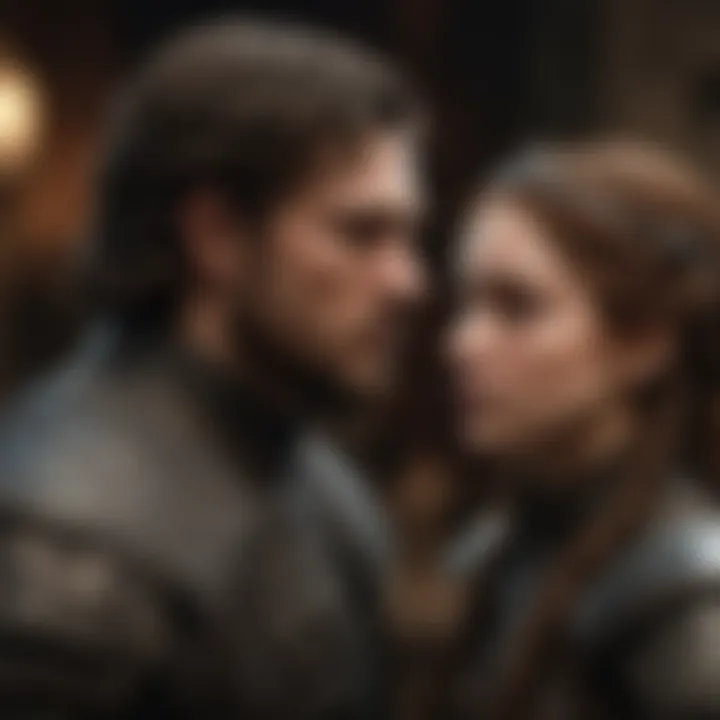
Complex Multi-Threaded Storylines
The series is famous for its complex multi-threaded storylines, which depict a broad and detailed world. Multiple characters navigate their paths which intersect or diverge, often unexpectedly. For instance, the journeys of characters like Jon Snow, Daenerys Targaryen, and Tyrion Lannister highlight various perspectives on power struggles. This complexity encourages viewers to pay attention to every character's decisions.
These threads create a rich tapestry that mirrors real life. Different narratives often reflect the same themes, such as betrayal, loyalty, or ambition. The way these narratives work together is a hallmark of Game of Thrones. Each character's story adds layers, creating a deeper understanding of the overall plot.
Foreshadowing and Symbolism
Foreshadowing and symbolism play critical roles throughout the series. Early hints about future events keep viewers engaged while provoking thought. For instance, the recurring motif of the direwolves serves not only as a literal connection to the Stark family but symbolizes their fate.
The use of visual and narrative foreshadowing allows audiences to speculate and form theories about characters and outcomes. This technique deepens the viewer's connection to the series, making it more than just a story but a puzzle to solve. The intricate symbolisms serve to highlight themes such as the inevitability of fate, the cost of power, and the cycle of life and death.
Climactic Moments and Their Impact
Climactic moments in Game of Thrones define its narrative arc. These pivotal scenes often pivotally alter the course of the story and the characters involved. Events like the Red Wedding or the Battle of the Bastards resonate deeply with viewers, as they reflect the harsh realities of the world within the series.
The impact of these moments extends beyond mere shock value; they inform character decisions and reshape the audience's understanding of the story. Each climactic event acts as a catalyst for change, forcing characters to confront their own morals and choices. The consequences that follow illustrate the themes of sacrifice, ambition, and the gray areas of ethics.
"In the world of Game of Thrones, the line between hero and villain often blurs, showcasing the complexity of human nature."
By analyzing the narrative techniques and plot structure, viewers can appreciate the skillful storytelling at play. Each technique enhances the show's ability to engage, challenge, and provoke thought, contributing to its status as an iconic series.
Thematic Explorations
The thematic explorations within Game of Thrones play a critical role in understanding the series' depth and complexity. They provide a lens through which the narrative can be examined, revealing layers of meaning and societal commentary. Themes such as power dynamics, family, loyalty, and the brutal realities of war resonate with viewers, making the story more than just a fantastical tale. Through these themes, the audience can find connections to their own lives, reflecting on moral ambiguities and the intricate nature of human relationships.
Such explorations help frame the motivations behind characters’ decisions. They offer insight into how personal and political conflicts intertwine, making Game of Thrones a richly textured narrative.
Power Dynamics and Moral Ambiguity
Power dynamics are central to the narrative of Game of Thrones. The struggle for power drives characters to extreme actions, often blurring the lines between right and wrong. Each faction wants dominion, whether it is through brute force or cunning strategy. This pursuit of power is inherently linked to moral ambiguity. Many characters, such as Cersei Lannister and Tyrion Lannister, make choices that highlight the difficult balance between ambition and ethics.
In this world, traditional notions of morality often fall by the wayside. Characters are frequently presented with choices that have no clear right answer. This complexity invites viewers to consider the consequences of the characters' actions and whether the ends justify the means. It portrays a nuanced view of human nature and societal structures.
Family and Loyalty
Family dynamics serve as both a source of strength and conflict throughout the series. The concept of loyalty is tested repeatedly, revealing how familial ties can be both a comfort and a catalyst for betrayal. For instance, House Stark epitomizes loyalty and honor, often struggling against disloyalty from within and outside the family. In contrast, the Lannisters portray a more complex loyalty, often prioritizing personal gain over familial unity.
These explorations expose the emotional vulnerabilities that accompany familial bonds. The consequences of loyalty, or lack thereof, shape the course of events within the series, leading to tragic outcomes and moral dilemmas. Characters, such as Ned Stark, are often forced into choices that sacrifice their own well-being for the sake of family. This concept resonates deeply, as viewers reflect on their own experiences with loyalty and family.
War and Its Consequences
War is an ever-present theme in Game of Thrones. It is depicted not merely as a backdrop, but as a destructive force that alters the lives of individuals and the landscape of the realm. The consequences of war stretch beyond battlefields, impacting communities and generations. The series challenges viewers to ponder the cost of conflict—loss of life, shattered alliances, and the moral decay that often follows in its wake.
Each war fought in the narrative stems from personal vendettas, political ambitions, or the quest for survival. The aftermath of these conflicts forces characters and viewers alike to confront the harsh realities of violence and the often unseen human cost. The theme of war pushes the narrative into darker territories, illustrating that victories can be hollow, and peace is rarely permanent.
"The things we do for love, they can often lead to profound consequences that we never foresee."
In summary, the thematic explorations of Game of Thrones serve to enhance the narrative's complexity. They invite deep reflection on power, loyalty, and the repercussions of conflict. These elements not only enrich character development but also engage the audience in a broader conversation about human nature and societal constructs.
Fan Theories and Community Ruminations
The realm of fan theories and community discussions serves as an important aspect of any celebrated series, and Game of Thrones is no exception. Fans have invested considerable time dissecting plot intricacies and character motivations, attempting to unravel potential outcomes and hidden meanings. These analyses not only enhance personal viewing experiences but also foster a deeper connection among viewers. By engaging with theories and ruminations, fans become part of a collective narrative, creating an enriching subculture where diverse ideas thrive.
Popular Fan Theories
Numerous theories have emerged within the Game of Thrones community, each adding layers to the viewer engagement. Some theories revolve around basic plots, while others touch upon complex nuances. A few notable examples include:
- Jon Snow's Parentage: The speculation surrounding Jon's lineage sparked debates for multiple seasons. The theory that Jon is the son of Rhaegar Targaryen and Lyanna Stark was ultimately revealed in later seasons, emphasizing fans' predictive abilities.
- Azor Ahai and the Prince That Was Promised: Many fans proposed that various characters held potentials for this pivotal prophecy, but the true identity remains elusive. This theory fuels ongoing conversation about reincarnation and fateful destinies.
- Bran Stark as the Night King: This controversial theory suggested that Bran, by time-traveling, inadvertently caused the events leading to the creation of the Night King. The ramifications of this theory sparked discussions about fate and choices within the series.
Each of these theories generated discussion forums, social media posts, and even fan fiction, illustrating the series' profound influence on its audience.
Community Contributions and Discussions
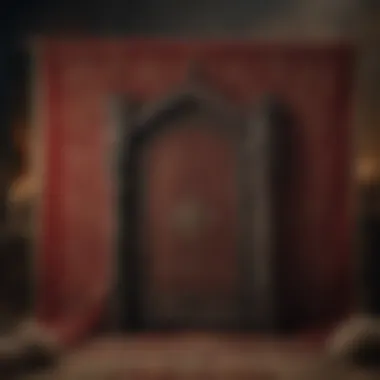
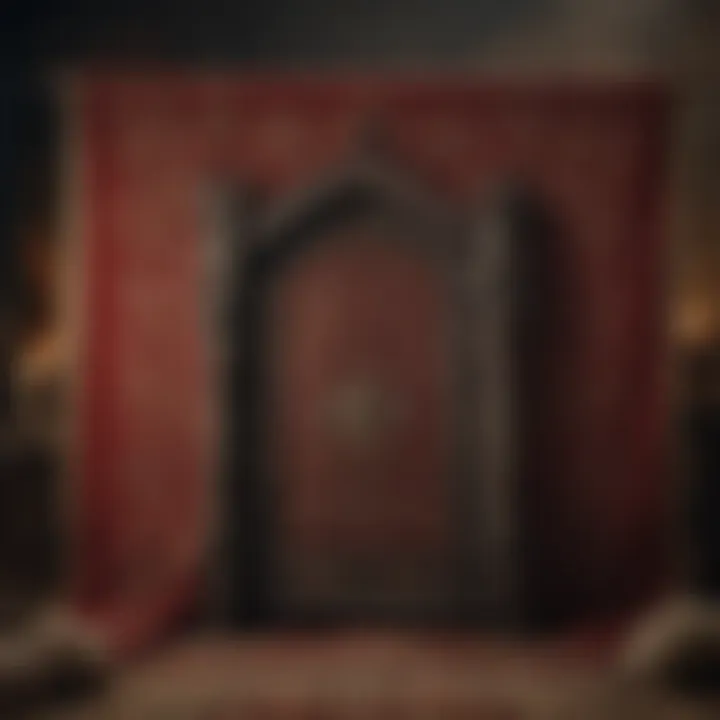
The Game of Thrones fandom showcases a rich tapestry of contributions from around the globe. Platforms like Reddit and Facebook have become hotspots for theorizing, exchanging interpretations, and sharing insights.
- Reddit Discussions: Subreddits such as r/freefolk and r/gameofthrones house countless threads where fans propose theories, share critique, and discuss episode outcomes. The immediacy of these discussions allows fans to react and reflect in real-time, enriching the overall experience.
- Facebook Groups: Various groups dedicated to Game of Thrones encourage members to share their observations and compile theories collectively. These discussions allow fans to bond over mutual interests and varied interpretations.
"The beauty of Game of Thrones lies not just in its storytelling but in the community it has created. Fans unite to debate, theorize, and celebrate every intricate detail of the series."
In summary, fan theories and community ruminations distinctly shape the legacy of Game of Thrones. They enhance understanding, create connections, and offer new perspectives that complement the viewing experience. The engagement of its audience has turned the series into a modern cultural phenomenon that continues to be analyzed and celebrated long after its conclusion.
Behind-the-Scenes Insights
Understanding the behind-the-scenes aspects of Game of Thrones is crucial for grasping its phenomenal success and cultural significance. The production values, direction, and casting decisions shape the essence of the series. They not only enhance viewer experiences but also bring depth to the character arcs and storylines that captivate millions. By exploring these insights, one gains an appreciation for the intricate planning and execution that went into making one of the most talked-about shows in television history.
Production and Direction
The production and direction of Game of Thrones were pivotal in realizing George R. R. Martin's complex world. The collaboration between various departments played a major role in crafting the series’ distinctive aesthetic. David Benioff and D.B. Weiss, the showrunners, were instrumental in translating the source material into engaging visual storytelling. Their vision helped to balance the grand scale of the story with intimate character moments.
High-quality sets and locations contributed uniquely to the narrative. Filming in diverse locations, from Northern Ireland to Croatia, provided authenticity that enriched the narrative environment. This allowed the series to authentically showcase the varied climates and cultures of Westeros and Essos. Additionally, the attention to detail in costume design complemented the character development. Each outfit often suggested much about the wearer's status and personality.
Furthermore, the choice of directors each season brought varied styles and focuses. Directors like David Nutter and Miguel Sapochnik crafted memorable episodes, known for their epic battles and emotional scenes. The use of practical effects, combined with CGI, created a believable world that contributed significantly to the suspension of disbelief among audiences.
Casting Decisions and Performances
Casting for Game of Thrones involved meticulous considerations to find actors who could embody the intricacies of their characters. The casting directors, especially Nina Gold, focused on selecting talent that brought depth to roles, regardless of prior fame. This approach allowed lesser-known actors to shine alongside established stars like Emilia Clarke and Kit Harington.
The performances delivered in the series are often celebrated for their emotive quality. These demonstrate the actors' abilities to navigate complex emotional landscapes. For instance, Peter Dinklage's portrayal of Tyrion Lannister showcased wit and vulnerability. His character arc became one of the most compelling narratives throughout the series.
Additionally, the chemistry between cast members influenced the authenticity of relationships on screen. This is particularly evident in the portrayal of familial ties, love, and betrayal, which often left a lasting impact on viewers. The decisions made here did not just serve storytelling, but also defined character trajectories and audience perceptions, making these elements crucial in the series’ acclaim.
“The casting process was meticulous, aiming to not just find actors, but the right actors who could bring the complexities of Martin’s characters to life.” - Casting Director Nina Gold
Game of Thrones in Contemporary Culture
The impact of Game of Thrones extends far beyond the small screen. By analyzing its role in contemporary culture, we can understand how it transformed viewing habits and expectations for narrative depth in television. The series not only changed our appreciation for storytelling but influenced productions, media marketing, and fan interactions across the globe.
Influence on Television and Media
Game of Thrones set a new standard for storytelling on television. With a rich, multi-layered narrative structure and complex character arcs, it demonstrated that viewers are capable of engaging with intricate plots that demand thoughtful viewing. This shift in how series are produced and perceived can be seen in shows like The Witcher and The Mandalorian, which echo some of the narrative styles established by Thrones.
The series also showcased the potential of high-quality production in television, making lavish sets and significant special effects a standard rather than the exception. The rise in production value has led to greater audience expectations, compelling networks to invest more in their storytelling efforts. Notable channels such as HBO have become synonymous with high-caliber shows, largely due to their success with Game of Thrones.
Additionally, the unique and daring decisions made in the series—like unexpected character deaths and moral dilemmas—have encouraged audiences to think of narratives in new ways. This trend is reflected in the rising prominence of shows that challenge traditional storytelling norms, encouraging creativity in plots across various genres.
"Game of Thrones not only captivated audiences but also initiated a revolution in how stories are told on the screen."
Merchandising and Fan Engagement
The merchandising strategies surrounding Game of Thrones have redefined how a television show can extend its brand. From collectibles and clothing to gaming apps and board games, the series has generated a vast array of products that appeal to diverse interests. Companies have adeptly marketed items from House Stark shirts to intricate replica swords, deepening the connection between fans and the series.
Fan engagement goes beyond just merchandise. Online platforms like Reddit and Facebook provide spaces for discussions, theories, and fan art, creating a vibrant community that keeps the excitement alive. These interactive platforms allow fans to delve deeper into the subject matter, analyze episodes, and speculate on future developments.
It is noteworthy how conventions and fan events have also surged in popularity, with Comic-Con hosting panels and signings featuring cast members. Such gatherings have turned fans into active participants in the Game of Thrones universe, fostering a sense of belonging and shared passion that extends even after the series has concluded. Fans are not merely passive consumers; they become integral to the ongoing legacy of the show.
In summary, Game of Thrones has had a profound impact on contemporary culture, shaping how television narrative is structured and perceived. Its strategies for merchandising and fan engagement have created a lasting influence, solidifying its place in both media and community spaces.
Epilogue
The conclusion of an analytical discourse surrounding Game of Thrones holds critical significance. It is here that we reflect on the myriad themes, character developments, and narrative complexities that define the series. This section brings together insights gathered throughout the analysis, emphasizing their relevance to the cultural landscape and the show's enduring legacy.
Legacy of Game of Thrones
The legacy of Game of Thrones extends beyond mere viewership statistics. It has reshaped the television landscape in several profound ways. One notable aspect is how it raised the bar for production values in television. The grandeur of its sets, combined with meticulous attention to detail in costume design, has set a new standard for what audiences can expect from serialized storytelling.
Furthermore, the show has influenced narrative structure in series that followed. Many subsequent shows attempt to replicate its multi-threaded storytelling, complex character arcs, and willingness to subvert traditional narrative expectations.
Critically, Game of Thrones also provided a lens into real-world issues, reflecting power dynamics, moral ambiguity, and the often cruel nature of humanity. This stark representation encourages viewers to think deeply about the implications of power and loyalty. Where we once had clear heroes and villains, the lines have been artfully blurred. The legacy is not just in entertainment but also in discussions springing from the series, both in academic circles and casual fan conversations.
Future of the Franchise
Looking ahead, the future of the Game of Thrones franchise appears to be evolving. With the successful release of prequels like House of the Dragon, there is a renewed interest in the Game of Thrones universe. This shift allows exploration into untold histories and character backstories that expand the original series’ narrative.
Moreover, potential new story arcs can capitalize on the established world, attracting both long-time fans and newcomers. The groundwork laid by the original series provides fertile ground for innovation in storytelling. From potential spin-offs to adaptations of complementary lore found in A Song of Ice and Fire, the possibilities are numerous.



